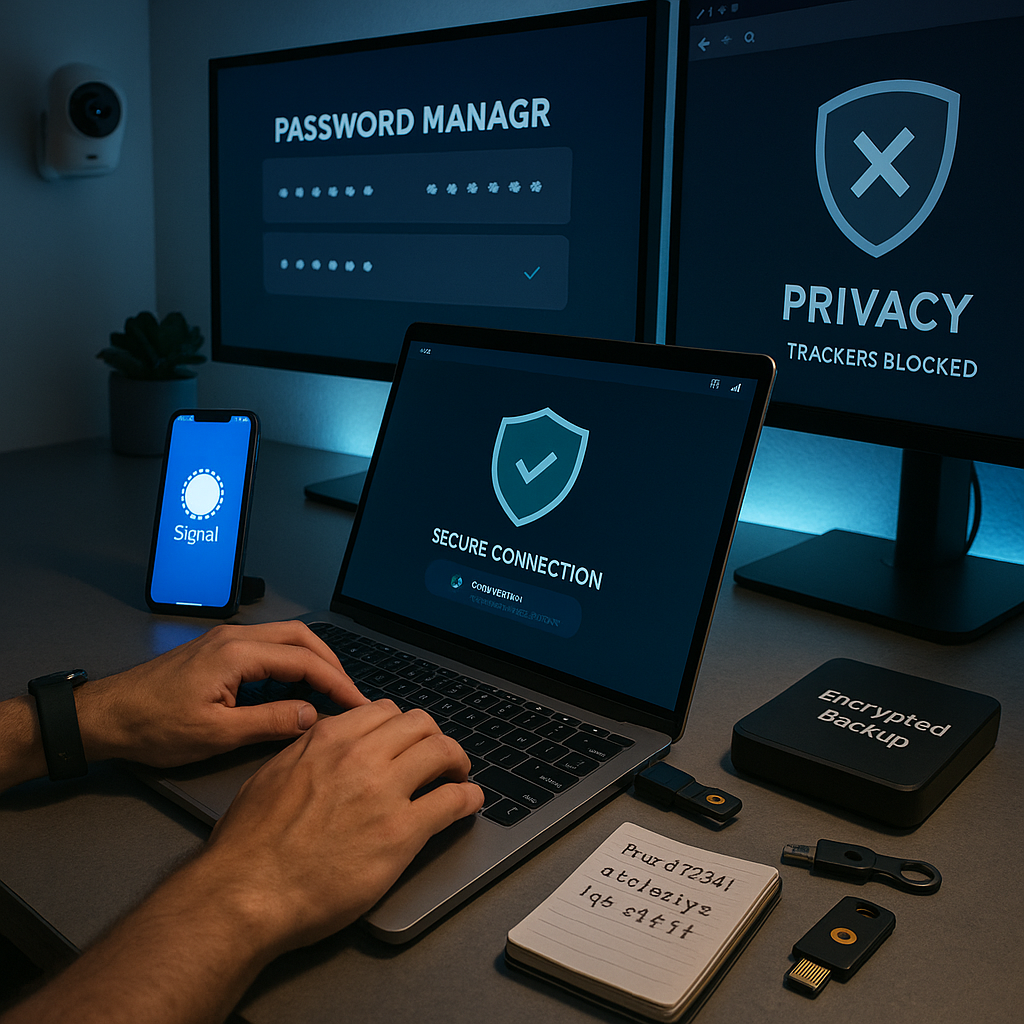Key Takeaways
- Empower your privacy with free VPNs. Reliable free VPNs mask your location and encrypt your data, making it harder for hackers, advertisers, or even your ISP to track your online activity.
- Guard your accounts with password managers. Free password managers create and store unique, strong passwords for every site, reducing the risk of breaches from weak or reused credentials.
- Browse safer using privacy-focused browsers. Browsers like Brave or Firefox help block trackers and intrusive ads by default, letting you surf with greater anonymity.
- Stay alert with real-time breach monitoring tools. Free services such as Have I Been Pwned notify you quickly if your information appears in a data breach, so you can act before scammers do.
- Control your data with privacy extensions. Browser add-ons including HTTPS Everywhere and Privacy Badger put you in control, automatically encrypting web traffic and blocking trackers as you go.
- Block unwanted access with free antivirus software. Trusted tools like Avast or Bitdefender offer real-time protection from malware, phishing, and suspicious sites without costing a dime.
- Enhance communication security with encrypted messaging apps. Free apps like Signal and Telegram keep your chats private, using end-to-end encryption to block eavesdroppers.
By using these free tools, you gain powerful protection without draining your wallet. In this comprehensive guide, we’ll explore how each solution works, provide practical tips for getting started, and share actionable advice to make your digital life more secure. No technical expertise required.
Introduction
Every click, swipe, or share leaves behind a digital trace, often revealing more about you than you might suspect. As data breaches and digital surveillance become increasingly prevalent, guarding your online identity and privacy is not just a recommendation; it’s a necessity.
Thankfully, there are robust and entirely free tools that help secure your data, fortify your accounts, and give you back control over your online footprint. These solutions are not only cost-effective but also user-friendly, making privacy more approachable than ever before. In the sections ahead, discover which free tools deliver genuine protection, how they function, and what practical steps you can take (starting today) to keep your privacy truly private.
Essential Browser Extensions for Privacy
Your browser is the gateway to the internet, but it can also be a major source of tracking and data collection. By arming yourself with privacy-focused browser extensions, you significantly reduce your exposure to third-party trackers, ads, and other surveillance technologies, all while enjoying smooth, uninterrupted browsing.
Un passo avanti. Sempre.
Unisciti al nostro canale Telegram per ricevere
aggiornamenti mirati, notizie selezionate e contenuti che fanno davvero la differenza.
Zero distrazioni, solo ciò che conta.
 Entra nel Canale
Entra nel Canale
Privacy Badger
Privacy Badger is an adaptive tracker blocker designed to enhance your browsing privacy as you surf. Unlike static blocklist extensions, Privacy Badger uses intelligent algorithms to identify and block hidden trackers dynamically.
- How it works: Monitors domains that attempt to track your activity across different websites and blocks those displaying tracking behavior.
- Key benefits: Requires no setup; automatically improves over time as it learns your browsing patterns.
- Limitations: Occasionally, may interfere with website functionality that depends on third-party trackers.
- Best for: Users seeking effortless, evolving protection with minimal input required.
Created by the Electronic Frontier Foundation (EFF), Privacy Badger is transparent and trustworthy, dedicated solely to user privacy with no commercial agenda.
uBlock Origin
uBlock Origin sets the standard for comprehensive content blocking, merging highly effective ad-blocking with privacy and security enhancements.
- Primary features:
- Blocks ads, tracking scripts, and malicious websites
- Minimal impact on system resources
- Customizability for advanced users, supporting personal filter lists and rules
- Offers defenses against browser fingerprinting
For greater control, users can activate “Advanced mode,” allowing granular management of what loads on each page. While this unlocks powerful options, it is most suitable for users comfortable with technical adjustments.
uBlock Origin’s open-source platform ensures security professionals can vet its code, reinforcing its reputation among privacy advocates.
HTTPS Everywhere
While modern browsers increasingly default to secure connections, HTTPS Everywhere remains a valuable tool for forcing encryption where possible.
- Core functionality: Upgrades HTTP connections to HTTPS on thousands of sites, protecting against eavesdropping and certain network attacks.
- Real-world benefit: Ensures your data remains encrypted, particularly on less secure or outdated websites.
- Limitations: Cannot create security where none exists. If a site doesn’t support HTTPS, the extension cannot encrypt your connection.
Although many browsers now integrate similar features natively, HTTPS Everywhere fills important gaps for sites that haven’t fully transitioned to HTTPS.
Cookie AutoDelete
Cookies can pose privacy risks by enabling persistent tracking and maintaining unwanted sessions. Cookie AutoDelete automates cookie management to minimize these risks.
- Deletes cookies automatically when tabs are closed
- Allows whitelisting for sites you trust (or wish to remain logged into)
- Offers clear visual tracking of deleted cookies
- Enhances isolation on Firefox by working with container tabs
By erasing cookies as you browse, this extension minimizes the footprint you leave behind while maintaining convenience for your trusted sites.
While browser extensions create a robust foundational privacy, a holistic strategy extends beyond the browser. Now, let’s explore how free VPNs further secure your connection at the network level.
Virtual Private Networks (VPN) – Free Options
VPNs are a vital layer in protecting your browsing habits and sensitive data, especially on unsecured public networks. By encrypting your internet traffic and masking your real IP address, VPNs offer a powerful shield against prying eyes and reduce your online visibility to advertisers and authorities.
VPNs are not just for advanced users; even beginners can set up these privacy tools with minimal hassle and gain instant improvement in anonymity online.
ProtonVPN Free
ProtonVPN’s free service distinguishes itself by offering unlimited bandwidth without requiring a subscription or sacrificing core privacy protections.
-
Key features:
-
Unlimited data transmission on the free tier
-
Strictly enforced no-logs policy, with regular third-party audits
-
Operations based in Switzerland, leveraging robust privacy legislation
-
Built-in threat protection
-
Limitations:
-
Server access is limited to three countries (US, Netherlands, Japan)
-
Only one device connection at a time
-
Free users may experience slower speeds during peak hours
-
P2P/torrenting disabled on free servers
With ProtonVPN’s strong ties to ProtonMail (a leader in encrypted email), users benefit from the company’s well-established privacy-first reputation.
Windscribe Free
Windscribe offers a feature-rich free VPN experience with a larger data allowance for users who verify their email address.
- Notable capabilities:
- Up to 10GB of data per month on the free plan
- Access to servers in 10+ countries
- Integrated blocking of ads and tracking domains via “R.O.B.E.R.T.“
- Firewall feature prevents IP leaks if the VPN connection drops unexpectedly
- Cross-platform availability, from desktops to mobile devices
For optimal protection, set Windscribe to launch at startup and enable its firewall, ensuring your real IP is never exposed, even if your VPN disconnects.
Un passo avanti. Sempre.
Unisciti al nostro canale Telegram per ricevere
aggiornamenti mirati, notizie selezionate e contenuti che fanno davvero la differenza.
Zero distrazioni, solo ciò che conta.
 Entra nel Canale
Entra nel Canale
Hide.me Free
Hide.me delivers a streamlined free VPN with clear communication about its limitations and privacy stance.
- 10GB of monthly data allowance
- Five available server locations for free users
- No-logs policy for user activity
- Modern protocol support, including WireGuard
- No in-app advertisements or payment information required to sign up
Hide.me’s straightforward, user-centered approach is excellent for those new to VPNs or needing privacy for occasional sensitive tasks.
Although free VPNs strengthen your online anonymity and security, users should recognize these services’ limitations, such as occasional speed drops and restricted server networks. Professionals, frequent travelers, or those needing specific international access may find premium VPNs worth the investment for their expanded features.
Next, let’s see how protecting your personal conversations is possible without sacrificing simplicity or convenience, through encrypted messaging and communication tools.
Secure Messaging and Communication
Most everyday communication tools (SMS, standard emails, many popular messaging apps) lack robust privacy safeguards. To keep your conversations private and secure, switching to encrypted and privacy-focused communication platforms is crucial.
End-to-end encryption plays a vital role in these tools, ensuring your messages are visible only to you and your intended recipients.
Signal
Signal is renowned worldwide for delivering strong encryption in a simple, user-friendly package, ensuring your messages and calls remain for your eyes (and ears) only.
-
Privacy features:
-
Automatic end-to-end encryption for all chats, calls, and files
-
Minimal metadata retention, preserving your anonymity
-
Optional disappearing messages for additional privacy
-
Screen security measures such as disabling screenshots in the app list
-
Real-world applications:
-
Secure individual and group messaging
-
Private voice and video calls across devices
-
Encrypted file sharing with high security
-
Available on iOS, Android, Windows, macOS, and Linux
As an open-source, nonprofit initiative, Signal’s development and funding structure align entirely with user privacy. No ads, trackers, or commercial exploitation here.
Jitsi Meet
Jitsi Meet offers a private alternative for secure video conferencing, ideal for virtual meetings or classes.
- Core functionality:
- Instant, encrypted video meetings in your web browser (no registration needed)
- Option to secure meeting rooms with passwords
- Features such as screen sharing and real-time chat
- Record meetings for later reference
For the highest privacy, tech-savvy users can deploy Jitsi Meet on their own server, granting full control over data and access.
ProtonMail
Encrypted email is essential for confidential correspondence, especially where sensitive or personal information is shared. ProtonMail brings advanced protections to your inbox.
- End-to-end encryption for messages exchanged between ProtonMail users
- Zero-access encryption ensures even ProtonMail cannot read your stored emails
- Operates under Switzerland’s rigorous privacy laws
- Free plan offers 500MB of storage and up to 150 messages per day
For added privacy, consider using separate ProtonMail accounts dedicated to different facets of your digital life (personal communications, shopping, financial business), which makes it harder for third parties to connect your online activities.
Although the free version includes some limitations, such as storage caps and fewer organizational features, its security components remain fully intact.
Now that your communication is secure, protecting your passwords and online identities is the next critical move. Let’s look at free password managers and identity protection tools…
Password Managers and Identity Protection
Reusing weak passwords across different websites is one of the leading causes of data breaches and account takeovers. Password managers not only generate strong, unique passwords for every service but also store and autofill them securely, allowing you to maintain top-notch security with minimal effort.
Password managers come in both free and premium versions and are a crucial pillar in modern security routines.
Bitwarden
Bitwarden is a highly-respected, open-source password manager delivering outstanding value and effective protection on its free tier.
-
Key capabilities:
-
Unlimited secure password storage across all devices
-
Built-in generator for strong, complex passwords
-
Automatic syncing between mobile, desktop, and browser extension platforms
-
Secure credential sharing for families and small teams (with slight limits on the free version)
-
Optional two-factor authentication for added security
-
Limitations of free version:
-
Lacks advanced features like encrypted file attachments and emergency access
-
Organization sharing is limited to two users
Bitwarden’s open development approach means security professionals can audit its code. This transparency is vital when trusting any service with your most sensitive login details.
Password managers like Bitwarden can be paired with breach alert services such as Have I Been Pwned. By registering your email, you receive immediate notifications if your credentials appear in known data leaks, giving you time to change passwords and lock down compromised accounts before they are exploited.
Expanding Protection: Free Antivirus and Beyond
Online threats are not only about tracked browsing or stolen passwords. Malware, phishing, and ransomware represent real dangers to your data, devices, and finances, whether you’re an individual or an organization.
Free antivirus apps like Avast Free Antivirus and Bitdefender Antivirus Free Edition provide powerful real-time protection, scanning files, downloads, and even email attachments for malicious threats.
- Both solutions update automatically to detect the latest digital threats, offering web and email shields to block malicious sites and phishing attempts.
- For mobile users, there are equivalent free antivirus apps to protect your smartphone or tablet from emerging threats.
In healthcare, these tools can protect sensitive patient data against ransomware attacks. In small businesses, they form a basic defense layer for office devices; and for educators, they ensure students’ online activity does not inadvertently compromise school networks.
Conclusion
You don’t need to be a tech expert (or spend a fortune) to keep your digital life private and secure. By combining free, user-friendly tools such as VPNs, password managers, privacy-first browsers, intelligent extensions, and encrypted messaging apps, even everyday internet users can build robust defenses against evolving online threats. These resources empower you to take charge, making your personal and professional activities more resilient to surveillance, hackers, and data mining.
Looking to the future, digital privacy will only become more vital as our lives increasingly move online and new threats emerge across industries. The individuals, educators, businesses, and organizations who commit to proactive, layered privacy strategies today will be the ones best prepared for tomorrow’s challenges. Start with the essential, free tools outlined above, and remember, staying informed and adapting your security habits is the most important upgrade you can make. In a landscape where privacy is power, the next step is yours. Choose to secure your digital world, and unlock the benefits of empowered, confident connectivity.





Leave a Reply